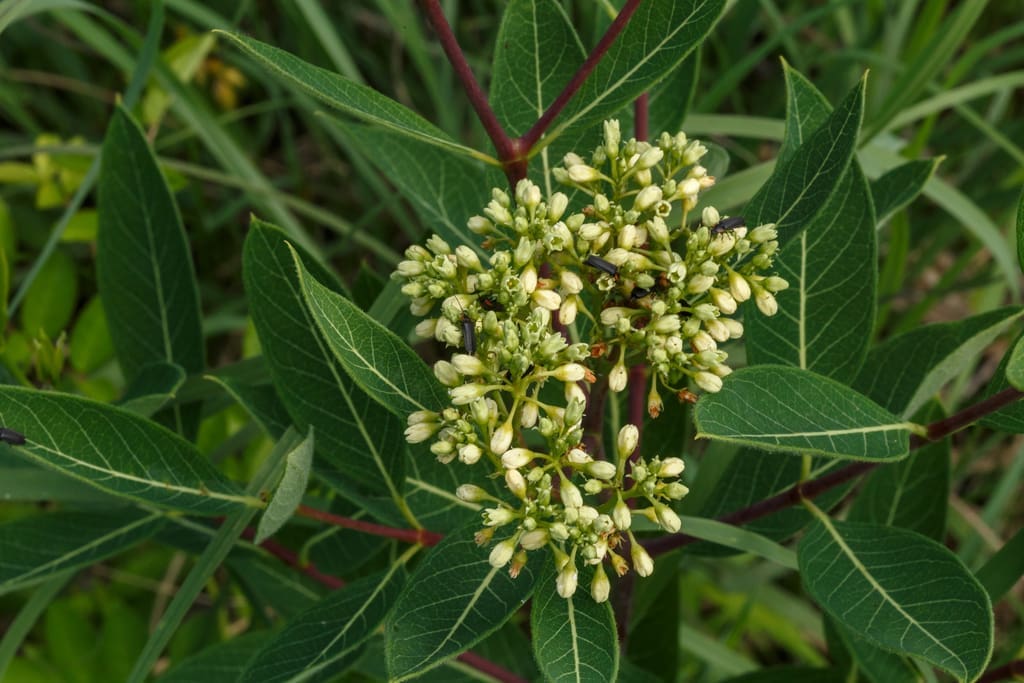
Apocynum cannabinum
Latin name: Apocynum cannabinum
Short name: Apoc
Common name: Indian Hemp | Canadian Hemp | Dog’s Bane
Primary miasm: Sycotic Secondary miasm(s): Psoric
Kingdom: Plants
Family: Apocynaceae
- Symptomatology
- Remedy Information
- Differentiation & Application
Derived from the fresh root of Apocynum cannabinum, a perennial herb native to North America. Belonging to the Apocynaceae family, the plant contains powerful cardiac glycosides similar to digitalis, making it toxic in crude form. In homeopathic dilution, its sphere of action centres on the heart, kidneys, and serous membranes, with marked influence over water balance and oedematous states.
Historically used by Native American tribes as an emetic, cathartic, and vermifuge, as well as for rope and cordage from its fibrous stems. In herbal medicine (now obsolete due to toxicity), it was administered for dropsy and heart failure.
Proved by Dr. W. Williamson and others in the 19th century, with extensive toxicological observations from herbal overdoses. Clinical experience from Dr. Hale and Dr. Burt greatly enriched its symptom picture.
- Heart and circulation – depresses the myocardium, slows but weakens the pulse [Hale].
- Kidneys – markedly affects renal secretion; produces scanty urine in dropsy.
- Serous membranes – hydrothorax, hydropericardium, ascites.
- Gastro-intestinal tract – nausea, vomiting, prostration.
- Skin – coldness, pallor, and clammy sweat in collapse.
- Rest and avoidance of exertion.
- Warmth (slight amelioration of chill).
- Sitting propped up to ease breathing in hydrothorax.
- Motion (aggravates breathlessness and prostration).
- Cold, damp weather.
- Lying down (fluid shifts worsen dyspnoea).
- Suppression of skin eruptions or discharges.
- Digitalis – Similar heart and kidney action; Apocynum more specific when dropsy coexists with scanty urine.
- Arsenicum album – Restlessness, anxiety, and burning pains more marked; Apocynum less restless, more passive prostration.
- Helleborus niger – Dropsy with suppression of urine, but more cerebral symptoms.
- Complementary: Digitalis, Arsenicum album.
- Antidotes: Camphora (in toxic doses).
- Inimical: None recorded.
A remedy of failing vitality and fluid retention, Apocynum cannabinum speaks to the exhausted heart and kidneys, where the system is water-logged yet the natural outlets are closed. It covers the picture of passive dropsy—pale, bloated, breathless, cold—where the body is drowning in its own retained fluids.
Valuable in ascites, hydrothorax, hydropericardium, and anasarca from heart or kidney disease. In pregnancy, may relieve some forms of cardiac dropsy. Best given in low to medium potencies, repeated cautiously to avoid aggravation.
Mind
- Indifference to surroundings.
- Dullness of mind in illness.
- Slowness in answering.
- Anxiety with breathlessness.
- Weak memory from prostration.
Head
- Heaviness in dropsy.
- Vertigo on rising.
- Fulness in hydrocephalus.
- Pale face with head symptoms.
- Headache from cardiac weakness.
Eyes
- Oedema of lids.
- Dark circles around eyes.
- Blurred vision with dropsy.
- Pale conjunctiva.
- Sunken eyes in collapse.
Stomach
- Nausea with dropsy.
- Vomiting of watery fluid.
- Distension after eating.
- Aversion to food.
- Heaviness in stomach.
Skin
- Cold, clammy sweat.
- Waxy pallor.
- Oedema of skin.
- Pitting on pressure.
- Pallor with collapse.
Extremities
- Swelling of ankles.
- Pitting oedema.
- Cold feet in dropsy.
- Weakness in legs.
- Heaviness of limbs.
Generalities
- Dropsy with scanty urine.
- Weak pulse.
- Aggravation from motion.
- Better sitting up.
- Prostration extreme.
Hale, E. M. – Detailed cardiac and renal sphere; keynote of scanty urine with dropsy.
Hering, C. – Mental dulness, indifference, and extreme prostration noted in advanced dropsy.
Clarke, J. H. – Emphasis on serous effusions and hydrothorax, with modalities.
Burt, W. H. – Toxicological symptoms, especially vomiting and cardiac depression.
